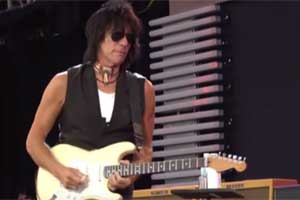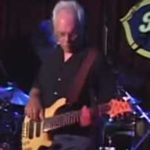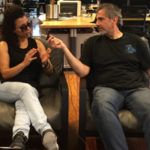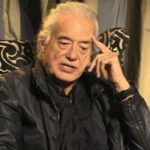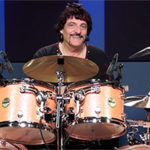With a new album just out, Jeff Beck talks about 50 years — and more — of guitar hero-dom
By Gary Graff
July 14, 2016
If they ever carve a Mount Rushmore for guitar legends, you can bet a spot for Jeff Beck has already been reserved. For more than 50 years, since joining the Yardbirds in 1964, he’s been a master player, a technician with taste who came out of early rock and blues to embrace and break new ground with influences from jazz fusion, Middle Eastern and electronica — and has still returned to his roots on projects such as the 1992 soundtrack to Frankie’s House and 1993’s Crazy Legs.
His resume includes his own iconic Jeff Beck Group (a prototype for Led Zeppelin and other hard rock bands) and the all-star Beck, Bogert & Appice, and his who’s-who list of guest appearances includes Mick Jagger, Stevie Wonder, original Beck Group singer Rod Stewart, Tina Turner, Diana Ross, Joe Cocker and many others.
This year the two-time Rock and Roll Hall of Famer is celebrating the 50th anniversary of his solo career (after being unceremoniously fired by the Yardbirds) with a new album, Loud Hailer, a book, BECK101, that documents his love of music and cars, and a summer tour with one of his own idols, Buddy Guy. A lot to talk about, so hi ho silver lining and off we go…
FGPO: Fifty years is pretty impressive. Does it feel like 50 years or 50 minutes … Or 500 years?
Beck: [laughs] When I’m at the airport it’s 500 years, but most of the time it’s in a flash — “Fifty years ago … Who’s that they’re talkin’ about?” Because in my head, I was one of those guys who loved it at 18 and wasn’t going to have anyone remove it from my head. So I look through most of my windows as an 18-, 21-year-old. It was a good time.
FGPO: When you hear or think about that kid from 1966 as a player, what do you think has happened during the past 50 years?
Beck: I think a series of kicks in the head, you know, from all the history of rock ‘n’ roll unfolding and smacking me in the face but offering challenges as well, just constant, constant challenges. That’s probably what sticks out most. And having those constant leaning posts like John McLaughlin and the whole Mahavishnu thing, which I think is way beyond most people at least at that time. I’ve followed John since then, and I can be confident that there’s at least some great music to be played. I mean, just to stay in the business without massive hit records is by no means a small feat, and if I’d thought about it I probably would’ve flipped out a long time ago. But I just stick with the guitar and investigate, wherever possible, the next move.
FGPO: Is hearing great music made by other people motivating for you, or can it be intimidating? Or both?
Beck: Well, there’s no point in being intimidated. I was intimidated by Jimi [Hendrix] when I first saw him. But when I put myself together coming out of this small club I just thought, “What are you gonna do? Are you going to fight or fly?’ And there wasn’t anything else I wanted to do. And the fact that he’d actually [cover] me at all, is probably what most other guitarists must have been feeling. Everyone thought: “How can anyone be impressed by what I’m doing?” I know that Jimmy Page, and I know for a fact that Pete Townshend was a bit taken aback. And we all have our own style and what we do, but it’s a bit embarrassing to have someone so flamboyantly doing exactly what we want to be doing — and doing it far better, I must say. So you find something else to do, because that’s what he does.
FGPO: You’re hitting the road this summer with new material but also alongside an old friend in Buddy Guy. That should be a nice juxtaposition.
Beck: Well, for the first time in some time I’m actually excited about it. With this new angle and the new material and Buddy, yeah, it’s standing next to the guy I idolized in 1963, that I used to see at this little island hotel. We used to go there and hang out there every couple of weeks. I distinctly remember we finished playing and the guy at the mic said: “Next week ladies and gentlemen we have Buddy Guy.” And I walked up to the guy and said, “Are you serious?” and he said, “Yeah, he’s coming over,” and in 1964 that’s when the whole band, the whole package came over. And I just thought that, “This is the most amazing blues show,” you know? He put on the most amazing show — one-handed playing, messing with the audience. And it just brightened up the blues for me, this electrifying performance. And it was in this little hotel in the middle of an Island. It actually opened up so much for me, and I’m sure Jimi Hendrix as well. I can hear Buddy in Jimi.
FGPO: And you’ll be doing a big 50th anniversary show in August at the Hollywood Bowl. What’s that going to be like?
Beck: Well, I’m going to keep most of the surprises under my hat. But, I mean, it’s 50 years, so it will be many of the big moments in my career linked together, hopefully. I can’t give too much detail, but I was going to do it in sequence, from Yardbirds to present time. But it may not turn out that way; perhaps some of the proposed guests may not want to be out that early in the evening. But we’re going to try to cover as much ground as we can.
FGPO: Loud Hailer covers plenty of ground, especially new and with some new collaborators. How did this all come to be?
Beck: It’s just one of those chance things, going to the right party at the right time. I was not really interested in vocalists; I was only really interested in maybe a different style of rhythm guitarist, or somebody who was, you know, flexible. But then I found out that Carmen [Vandenberg], who I meet at [Queen drummer] Roger Taylor’s birthday party, was a huge fan of Albert Collins. And that really did it; the fact that she was so young and new and finding out that she was a huge fan of Buddy Guy and Albert Collins, my ears grew bigger, you know? She invited me to see her and her friends play at a gig in London, and I was blown away. It was just the two of them, Carmen and Rosie [Bones] and a drummer and it sounded gigantic without being deafening, I mean it was a very powerful sound. And the songs were original, and I just thought: “Wow they’re great.” So instead of just getting a rhythm guitarist I got a vocalist as well [laughs].
FGPO: When you were watching them, did you start to hear the possibilities for what became Loud Hailer?
Beck: No, not at all. They had a very straight sound with their songs, and I didn’t want to interfere. I invited them to dinner that same evening, after the show, and the first thing I said to them at the dinner table was: “Number one, I’m not going to interfere or climb on your case.” Rosie was not in the frame until she came to the house; I wasn’t even looking for a vocalist. I was more concerned with whether Carmen could fit the shoes that were there before. And it sort of just unfolded naturally, you know? It was very fast but very natural.
FGPO: It’s a very kind of open creative attitude, too. You’re so well established in your lane, or lanes, that you hardly need to embark on this new musical path.
Beck: Originally Carmen was going to come to the house, and we were going to start reinventing the wheel, in the sense that I was going to help her learn certain things, which I did do. But when I aimed these ideas for songs at Rosie it just took off after about three days. She was able to just sit down and write lyrics. And none of us knew what they were until she was ready to sit down and commit. She recorded by herself on her own laptop device, and we played and recorded these demos with her lyrics borne off my input from various sources. And as soon as we were able to put some rhythmic accompaniment to it, it all seemed to come together. That’s when Filippo [Cimatti] came in; I was so impressed with the sound that they got at their gig that, well, who else is there that can come straight on board and help out with recording? And he came and put this gigantic drum sound underneath, these techno drums but later we changed them to real drums in order to be playable on stage; although there is some electronics there, some techno drums, they’re mostly real drums.
FGPO: The electronic influences seemed to be implied here rather than direct, though.
Beck: Yeah, yeah, that’s the idea. I was dying to try and bring to the table something that they would know what to do, like what chord sequence on “Shame.” I don’t think [Bones] really knew what doo-wop, was; I just played the C, A Minor and the key is G. And when I played them, Filippo just leapt up and down, because those doo-wop changes are still just the most irresistible changes, and to hear them latch on and write the lyrics, I just thought this was amazing, just very touching. But it also enabled me to legitimately have that chord sequence on my record.
FGPO: What was the impact on your overall approach for your guitar on Loud Hailer?
Beck: What it allowed me to do was become more of an accompanist, so not to do an album of guitar recitals … the Blow By Blow center-stage thing. That’s gratifying, but I got back to what I really love, which is accompanying vocals. Because aside from the few, half a dozen great instrumentals, all great rock ‘n’ roll guitar playing has been more effective when it was minimalist. Like an Elvis Presley/Gene Vincent, you know, Carl Perkins; those records and those solos are not long, and there’s maybe two solos in these songs. That’s where the punch comes, in that short brevity, the actual explosion in those short solos, and I can do that. And this album has enabled me to accompany some of the softer songs and to go nuts on the heavier ones. It’s like a tennis match, you know; you have to match the vocals.
FGPO: Were you working on the BECK101 book concurrently with Loud Hailer, and did doing one impact on the other in any way?
Beck: Not really. I think the book should’ve been out about six months ago, but I kept finding more amazing pictures in my collection — that and Genesis kept digging out more, so we kept adding and deleting, And it just got delayed and delayed, and it got delayed to where it just made more sense to delay it to coincide with the tour. I wasn’t so sure about [including] the cars because ZZ Top has sort of perfected what to do with the cars with Eliminator and all their music videos with the cars. But [Genesis] said: “Look, you’ve built the cars. You’ve built the chassis. You’ve built five, six, seven cars, so you should include them.” I don’t like the idea of somebody hoisting their hobby on somebody, but when I thought about it I thought maybe there’s enough people who’re interested in seeing how they all came together.
FGPO: You have a close affinity with Jimmy Page, both musically and personally. What did you make of the “Stairway To Heaven” plagiarism suit?
Beck: I had to smirk because I knew that Jimmy and Robert would come out on top. Apparently you can’t copyright a chord sequence. It has to have a lyric or some kind of a meaningful melody to be copyrighted. And it is a chord sequence which has been used loads of times, but not in such an iconic way. It clearly is the same chord sequence [as Spirit’s “Taurus”], but then we’re all guilty of stealing a chord sequence and sticking some words on top of it. So I think it’s a bit of bravado to try to bring it to court, but Jimmy came out ahead. So, lucky Old Jim!
